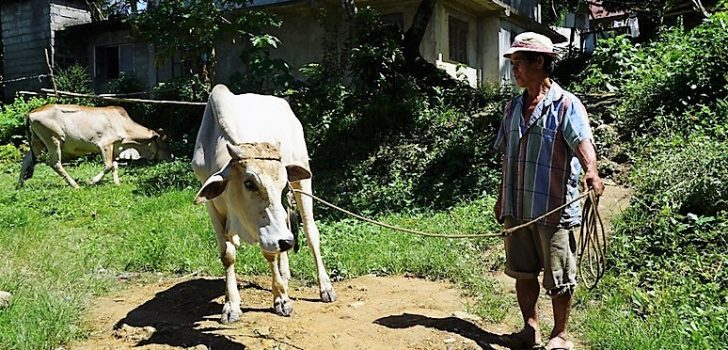
Villaviciosa folks to benefit from Cattle Fattening and Marketing enterprise thru PRDP’s I-REAP component
To recover losses caused by super typhoon Lando that devastated agricultural plantations in 2015, the Philippine Rural Development Project (PRDP) offered a short term recovery intervention in the form of Small Livelihood Project (SLP) scheme (now Micro Enterprise Project) under the Enterprise Development (I-REAP) component of the project.
Nine farmer groups from Villaviciosa, Abra were beneficiaries of this scheme, having received 298 heads of cattle by virtue of an approved proposal they have submitted to the PRDP.
The said farmer groups come from barangays Ap-apaya, Bolilising, Callao, Dungsayan, Kaltawan Poblacion, Lumaba, Tamac, and Tuquib in the municipality of Villaviciosa, province of Abra.
As gleaned from DA-CAR report, the total typhoon damage in the Province of Abra as of October 30, 2015 has reached an estimated amount of P60 million pesos worth of crops including rice, vegetable and livestock.
“Typhoon Lando caused landslides and erosions that damaged around 15-20% of rice and vegetable farmlands in Abra, thus the enterprise,” said Danilo P. Daguio, Deputy Project Director of CAR said.
SLPs are micro projects under the I-REAP component of PRDP that can be proposed by farmers and fisherfolk in calamity-stricken and conflict-affected areas.
“The SLP, now called micro-enterprise, is a livelihood assistance to calamity-stricken farmers and fisherfolk in the country. The PRDP funded these projects to provide sustainable income generating activities to farmers and fisherfolk affected by typhoons through interventions that would respond quickly to their basic needs and restore their livelihood. The SLPs/micro enterprises also intends to provide production and marketing support in order to increase the income of farmers and fishers in affected areas”, said I-REAP Component Head Joscelyn W. Beray.
The proposed micro-enterprise elaborates that upgraded male Brahman breed shall be distributed to the eligible farmer groups after being equipped with the necessary skills from feeding, maintaining animal health, housing management up to marketing.
Accordingly, the recipients must provide for a comfortable shed intended to house the cattle before they can receive one.
The scheme accounts that the recipients shall fatten the cattle for a period of six to eight months from receipt thereof. The cattle is expected to have reached at least a marketable weight of 325 kilograms in order to realize income.
“For additional income, the enterprise is envisioned to encourage the farmer groups to engage in continuous production and supply of beef and beef by-products. Meat processing is seen as an added business enterprise for the municipality,” added Beray.
“With an add-on increase in household income, economic activities and exchange of goods in the area will be stimulated,” she said.
The farmer-groups have adopted the roll-over scheme where the amount of P30, 000.00 should be surrendered to the association after selling the cattle to be once again used to purchase several heads to be distributed to other eligible members who haven’t yet received any.
Edwin Roman, President of the Bolilising Farmers’ Association explained that each association was given only 33 heads cattle each for distribution to their members. “This roll- over scheme will allow the same opportunity to other members to experience cattle raising and hopefully to continue the enterprise so that our municipality will become a cattle fattening station as well as a beef supplying municipality,” he said.
The scheme is said to increase the beneficiaries’ household income by at least 5% after one production cycle.
PRDP is a six-year project assisted by the World Bank and implemented by the Department of Agriculture aimed at reducing poverty in the country’s rural communities through investments in identified priority commodities. (Ma. Imelda Isabel B. Zabala, RPCO-CAR InfoACE Unit)
